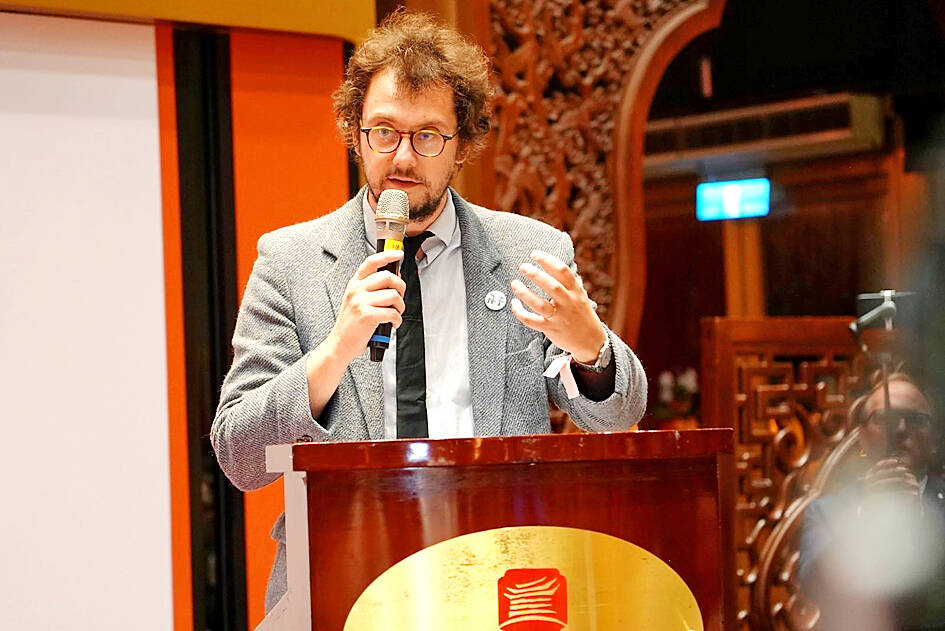Reporters Without Borders (RSF) director-general Thibaut Bruttin praised Taiwan’s free media in an interview last week, but added that work still needed to encourage more editorial independence in local newsrooms.
“Taiwan can be proud of its free media ... [but] we think it’s important to go to the next step,” Bruttin said in an interview in Taipei on Friday.
Bruttin lauded Taiwan as a “role model” for press freedom in Asia and said he hoped that it would continue to “build up its model” and “show the way to other countries in the region.”

Photo courtesy of RSF via CNA
In the 2024 World Press Freedom Index released by RSF in May, Taiwan moved up eight positions from last year to 27th in the rankings out of 180 countries and regions, and ranked second in Asia after East Timor.
“Taiwan really is one of the test cases for the robustness of journalism in the world,” he said, reflecting on the nation’s transformation from an authoritarian regime that censored information into a vibrant democracy that fights disinformation.
However, Taiwan’s free press is not without criticism, Bruttin said, calling for media reforms to address the lack of editorial independence in newsrooms, which he said had undermined the media’s credibility.
Bruttin, who visited Taiwan for the first time as the head of RSF from Monday to Friday last week to celebrate the seventh anniversary of the non-governmental organization’s Asia-Pacific office in Taipei, described the “credibility deficit” in a recent op-ed as “a real Achilles heel of Taiwanese democracy.”
“It’s good that the media is free, but freedom is not necessarily something that sums up what journalism is,” he said. “At RSF, we fight for free, independent and pluralistic media.”
Taiwan must work on preventing its journalism industry from being “weaponized” against democracy, Bruttin said, warning against “narratives that are obeying vested interests, either commercial or ideological, or geopolitical.”
He said the polarized and politicized media has resulted in a credibility crisis in journalism in Taiwan, citing the Digital News Report issued by the Reuters Institute for the Study of Journalism.
The report said that in Taiwan, only 33 percent of 2,011 respondents said they trusted most news most of the time.
RSF has called on the government to increase funding for public media, adopt a “coregulation” mechanism to encourage editorial independence and provide incentives to media outlets committed to respecting journalistic ethics, among other measures.
Bruttin said RSF would continue using Taiwan as an Asia-Pacific hub for its monitoring and advocacy work in 33 countries and regions in East Asia, Southeast Asia and Oceania.
One of the main issues is to continue calling for the release of Hong Kong media mogul and pro-democracy activist Jimmy Lai (黎智英), who has been in detention since December 2020 for his alleged involvement in democracy protests that rocked the territory a year earlier.
“We need to make people aware of the fact that they are keeping locked in solitary confinement a 70-something media executive who just had one of the freest, most popular Hong Kong dailies,” he said.
Lai, 76, is facing charges of collusion with foreign powers under the draconian National Security Law introduced by Beijing in June 2020 and could face life imprisonment.

Taiwan has received more than US$70 million in royalties as of the end of last year from developing the F-16V jet as countries worldwide purchase or upgrade to this popular model, government and military officials said on Saturday. Taiwan funded the development of the F-16V jet and ended up the sole investor as other countries withdrew from the program. Now the F-16V is increasingly popular and countries must pay Taiwan a percentage in royalties when they purchase new F-16V aircraft or upgrade older F-16 models. The next five years are expected to be the peak for these royalties, with Taiwan potentially earning

STAY IN YOUR LANE: As the US and Israel attack Iran, the ministry has warned China not to overstep by including Taiwanese citizens in its evacuation orders The Ministry of Foreign Affairs (MOFA) yesterday rebuked a statement by China’s embassy in Israel that it would evacuate Taiwanese holders of Chinese travel documents from Israel amid the latter’s escalating conflict with Iran. Tensions have risen across the Middle East in the wake of US and Israeli airstrikes on Iran beginning Saturday. China subsequently issued an evacuation notice for its citizens. In a news release, the Chinese embassy in Israel said holders of “Taiwan compatriot permits (台胞證)” issued to Taiwanese nationals by Chinese authorities for travel to China — could register for evacuation to Egypt. In Taipei, the ministry yesterday said Taiwan

Taiwan is awaiting official notification from the US regarding the status of the Agreement on Reciprocal Trade (ART) after the US Supreme Court ruled US President Donald Trump's global tariffs unconstitutional. Speaking to reporters before a legislative hearing today, Premier Cho Jung-tai (卓榮泰) said that Taiwan's negotiation team remains focused on ensuring that the bilateral trade deal remains intact despite the legal challenge to Trump's tariff policy. "The US has pledged to notify its trade partners once the subsequent administrative and legal processes are finalized, and that certainly includes Taiwan," Cho said when asked about opposition parties’ doubts that the ART was

If China chose to invade Taiwan tomorrow, it would only have to sever three undersea fiber-optic cable clusters to cause a data blackout, Jason Hsu (許毓仁), a senior fellow at the Hudson Institute and former Chinese Nationalist Party (KMT) legislator, told a US security panel yesterday. In a Taiwan contingency, cable disruption would be one of the earliest preinvasion actions and the signal that escalation had begun, he said, adding that Taiwan’s current cable repair capabilities are insufficient. The US-China Economic and Security Review Commission (USCC) yesterday held a hearing on US-China Competition Under the Sea, with Hsu speaking on